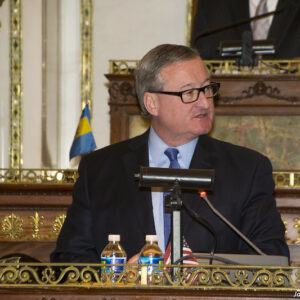Suburban residents who normally commute into Philadelphia for work but stayed home due to the pandemic—at the urging of Gov. Tom Wolf and Mayor Jim Kenney—are caught in a Catch-22.
They’re facing red tape and hurdles as they try to get reimbursed by Philadelphia for the wage taxes they paid while working from home, beyond the reach of the city’s tax collectors.
After learning about this problem from a constituent, state Rep. Wendi Thomas (R-Richboro) rallied her fellow Bucks County legislators to send a bipartisan letter to Kenney asking him to drop a requirement that suburban residents ask their employers to confirm they were required to work from home.
Delaware Valley Journal has previously reported on how difficult the city is making it for former commuters to get wage-tax refunds.
Suburban lawmakers are also upset that, during the pandemic, Philadelphia raised the wage tax on suburban commuters but not city residents. Employees who are non-residents of Philadelphia and work in the city are subject to the Philadelphia Wage Tax at a rate of 3.5019 percent, up from 3.4481 percent since July 2020.
“Anyone still going into the city was an essential worker,” said state Rep. Thomas. “Let’s say a nurse lives in Richboro. She’s going to work during a pandemic and they raise the city wage tax on her. It’s seriously illogical to me. I want to be fair. I’m all about fairness. This isn’t fair. We all know if we live here, we pay the city wage tax. Now you raise the tax on essential workers, then put up hurdles for those people who aren’t essential workers to get their money back. I feel like I must be missing something. It’s just not right.”
While Thomas was not sure how many workers this affects or the sums of tax money on the table, she said, “Due to this hurdle, suburban workers will leave thousands of dollars in the city coffers for hours worked in Bucks, Montgomery, Chester and Delaware counties. That’s money the city is not entitled to.
The Bucks County legislators believe the city is making it unnecessarily difficult for suburban residents to receive this refund of their wages which they are entitled to under state law. The suburban towns that impose a 1 percent earned income tax are also entitled to a portion of the money the city has collected, Thomas noted.
“Given the state mandate to work remotely unless impossible up until April 1, 2021, (and it is still strongly encouraged by Gov. Tom Wolf according to his most recent guidance to business) the requirement to provide an employer letter is burdensome and unnecessary,” the delegation wrote in their letter to Kenney.
Legislators who joined Thomas in signing the letter include state Reps. Frank Farry (R-Langhorne), Tina Davis (D-Levittown), John Galloway (D-Levittown), Shelby Labs (R-Doylestown), Todd Polinchock (R-Chalfont), Meghan Schroeder (R-Warminster), Craig Staats (R-Quakertown), and KC Tomlinson (R-Bensalem), and Perry Warren (D-Yardley), the entire state House delegation from Bucks County. Thomas plans to enlist legislators from the other suburban counties to join the Bucks delegation and advocate for their constituents, too.
Collar-county lawmakers aren’t the only people who object to the city’s attempt to tax beyond its borders.
“Rather than focusing efforts of slow-rolling repayments of overpaid taxes; it would be better if the city worked to reopen Philadelphia businesses, restaurants, and attractions,” said Guy Ciarrocchi, president and CEO of the Chester Chamber of Commerce. “And it’s imperative the city encourage workers and visitors to come back by making it safe to be there. If they do that right, the city would recoup that repaid money—and, more.”
Leo Knepper CEO of Citizens Alliance of Pennsylvania, says Philly’s government “has been nickel and diming taxpayers from around the state for decades. It doesn’t come as any surprise that they’re making it as difficult as possible for taxpayers to be reimbursed for money that Philadelphia is not entitled to keep.”
The wage tax issue has even caught the eye of Americans for Tax Reform, a national pro-taxpayer organization.
“Politicians who imposed taxes on commuters with the argument that their arrival in the city increased demands for roads and other services should be ashamed of themselves for trying to collect such taxes when citizens work from home and place no real demand on city services,” said Grover Norquist of Americans for Tax Reform. “It is now just a grab for cash that will encourage new companies to avoid bringing workers into the city.”
And Nathan Benefield, vie president and CEO of the Commonwealth Foundation, said, “Philadelphia’s city wage tax is one of the most onerous and economically damaging taxes any local government has. Supposedly the tax is to cover the services commuters receive, but if they aren’t traveling into the city, they aren’t getting Philadelphia government service. The city’s refusal to reimburse suburban workers staying at home is unfair to those families, and further discourages any businesses from setting up shop in Philadelphia.”
Reps. Farry and Thomas have introduced legislation to amend the Sterling Act (Commuter Tax), House Bill 949 and prevent this from occurring in the future.
The Sterling Act, enacted in 1932 to assist Philadelphia during the Great Depression, is Pennsylvania’s first local income tax enabling legislation and grants the City of Philadelphia broad taxing authority, the state legislators said in a press release.
A spokesperson for Kenney did not immediately respond to a request for comment.

